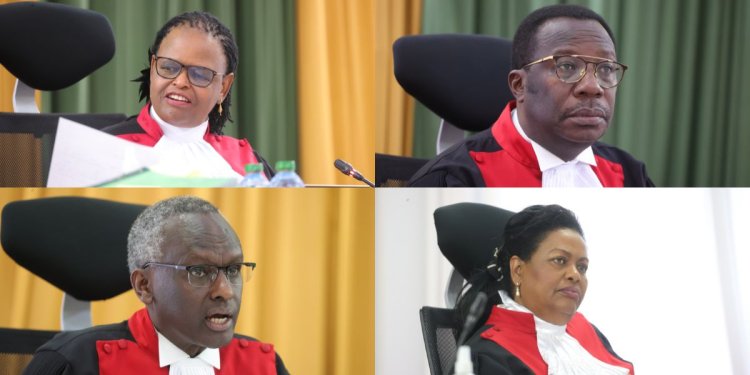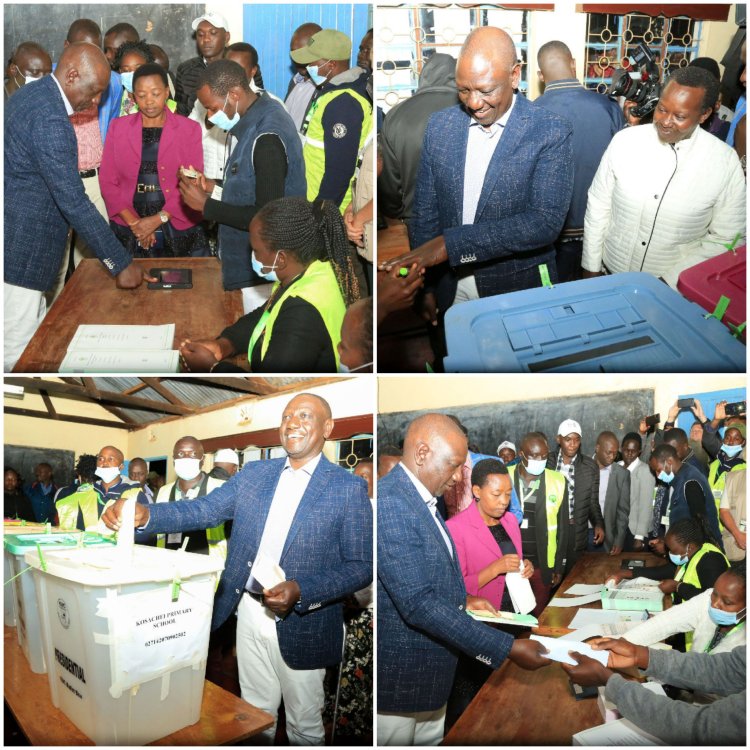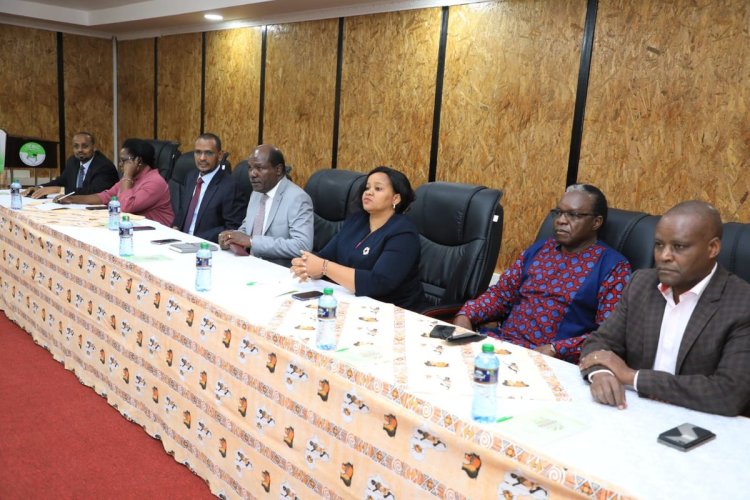Ruto, Raila Lawyers Answer Questions From Supreme Court Judges
The Supreme Court of Kenya is responding to questions it had fielded to the legal team of both president-elect, William Ruto and Azimio la Umoja leader Raila Odinga, who is the main petitioner.

The Supreme Court of Kenya is responding to questions it had fielded to the legal team of both president-elect, William Ruto and Azimio la Umoja leader Raila Odinga, who is the main petitioner.
Independent Electoral and Boundaries Commission (IEBC) lawyer George Murugu went first in responding to the questions raised regarding the matter of stray ballots.
Question On Stray Ballots
"A voter shall be provided with ballot papers for all in the multiple elections he is expected to cast his vote in respect to all the elective post.
"The law declares that it is an offence to knowingly fail to place a ballot paper issued to him inside a ballot box. A marked ballot paper is treated as rejected and is void and shall not be counted," he addressed.

DP Ruto casting his vote on August 9, 2022. /FILE
"Regulation 69 of the general election regulations provides that a voter will be issued with ballot papers for all elections in a multiple election. The voter is expected to cast his votes in respect of all the elections and section 69 (3) makes it an offence for a person to knowingly fail to place his or her ballot paper issued to him inside a ballot box."
Lawyer Mahat Somane backed up his answer by revealing that the integrity of the ballot is very important and that it is a criminal offence for someone to get out with ballot papers or election material from the ballot box.
Chebukati's Powers
On the matter of chairperson Wafula Chebukati's gazettement, as a national agent or returning officer, the lawyer explained that it was up to the mandate of the commission chairperson to declare the results.
"The gazettement of was not for purposes of Article 138 C but specifically for Article 138 (10) to fulfil that role."
"The gazette Notice is purposely to tell Kenyans that the Constitution has rested powers upon this office to declare that result. That gazette notice should not be read to mean the chairperson had gone rogue," he addressed.
Article 138 10 states that the chairperson within seven days after the presidential election, shall declare the result of the election and deliver a written notification of the result to the Chief Justice and the incumbent President.
"The gazette Notice is purposely to tell Kenyans that the Constitution has rested powers upon this office to declare that result. That gazette notice should not be read to mean the chairperson had gone rogue," he noted.
Delay in Announcing Results
Murugu also explained that the commissioners being threatened with arrests and abductions during the tallying had disrupted the tallying of the results.
"The 27 constituencies had been tallied, undergone the verification processes, and were ready for announcement. Mr Chebukati made considerations concerning the security of his staff, who at the time were suffering arrests, abductions, and injuries. In his mind, it was prudent to conclude the exercise since Article 138 (3c) had been fully satisfied," he argued.
Backing up his sentiments, Prof Kithure Kindiki argued that by the time 4 members of the National Security Advisory Council (NSAC) arrived at the Bomas of Kenya, they knew that verification and tallying were complete and what remained was the declaration. According to him, they went there to alter the sovereign will of the people.
"The results could not be announced the following day because by that time it wasn’t possible for any form of consensus with the 4 walk away commissioners and it was clear, that their intention was to try and veto the will of the people," he argued.
Chebukati Acting Alone
Justice Njoki Ndung'u had asked why Chebukati had assigned menial duties to other commissioners.
"It seems that Chebukati works with the CEO who is not vetted by the parliament but appointed, he seems to wield immense powers over and above the other commissioners. What is the role of these commissioners?
From the narrative, we are hearing in court, there seems to be an all-powerful chair. What would happen if he was to announce the wrong results, mentally incapacitated, sick or dead?" she posed.
Lawyer Murugu explained that Article 138 3 (c) gives the Commission a joint role in announcing the results and that after counting the votes in the polling stations, the IEBC shall tally and verify the count before declaring the result.
"There was no room for the chairperson to act as a lone ranger," Murugu noted.
Venezuelans Arrested At Airport
Justice Smokin Wanjala challenged Mahat Somane to explain his concession that the Venezuelan who was arrested at the Jomo Kenyatta International Airport (JKIA) had access to the server, as part of the maintenance.
Somane indicated that the three Venezuelans arrested before the election had no access to IEBC systems as claimed in the petition.
However, lawyer Julie Soweto demonstrated to the court how figures were changed in some of the forms 34A.
Jose Camargo (Venezuelan) is the person who decided the president-elect of Kenya. He is the one who was interfering with the forms - Julie Soweto #KenyasChoice2022 #SupremePetition pic.twitter.com/VNp5i4xjpV — Citizen TV Kenya (@citizentvkenya) September 2, 2022
"Jose Camargo (Venezuelan) is the person who decided the president-elect of Kenya. He is the one who was interfering with the forms," she said.
"We didn't make this up! We were told that we forged these forms, but this is how, My Lord, the staging was happening. This is on August 9 when we were told they (Venezuelans) did not have access to the system."
Backing up her sentiments, lawyer Paul Mwangi explained that Camargo appeared on a Form 34A from Gacharaigu Primary School, Murang'a County.
On 1.6 Votes transmitted after voting closed.
Justice Ouko had referred to Okiya Omtatah's petition, which stated that 1.6 votes continued streaming after the closure of the voting process on Tuesday, August 9. However, Somane explained that the KIEMS Kits continued transmitting results after the voting exercise ended.
"Omtatah says 1.6 people curiously voted the polls closed on Tuesday, August 9. This is a faulty analysis. You really have to understand how the kits work; when you open the polling station, the kits send a message.
People pass through it and send automatic returns. It pins to the nearest network and sends automatic returns. If is not able to get the network, it will keep that information for the next two hours. So that is how the number changes," he noted.
Somane noted that the votes Omtatah was referring to were likely transmitted from kits that were deployed in areas with poor network coverage.
How 4 IEBC Commissioners Read Unverified Results
Former Prime Minister Raila Odinga through his lawyer, Senior Counsel Paul Mwangi, revealed that the four commissioners at the IEBC showed that they read unverified results by making errors in their announcements.
Justice Isaac Lenaola had questioned Raila's legal team regarding the commissioners dissenting the results they had participated in verifying.
"Commissioners were together until the 11th hour. What evidence do we have this was not an afterthought and that they are not doing this in good faith?" he challenged.
However, Mwangi indicated that there was no sufficient evidence to show that four undertook verification of the results, given that some of them were forced to correct the results they had announced. He gave an example of how Commissioner Justus Nyang'aya had announced inflated results for Ruto before correcting it afterwards.

"After Nyang'aya reads the results in the Kiambu town constituency, it was stated that Ruto's results went over 10,000 votes. That shows that the commissioner did not know what he was doing and is forced to come to read the results afresh.
"Vice-chairperson Juliana Cherera was also given results to read in Juja constituency - inflated results in favour of Ruto. I will leave it for them to explain that better," he said.
On National Security Council Knowing About Results Before Chebukati's Announcement
Attorney General Kihara Kariuki dismissed claims that the National Security Advisory Council (NSAC) had attempted to subvert the presidential results in favour of Raila.
Kihara indicated that the Head of Public Service Joseph Kinyua - who also doubles up as NSAC chairperson - visited the National Tallying Center to obtain the final tally of the presidential results.
"The evidence before you by the chairman was that he (NSAC chair) had gone to obtain the final tally only after he had met the Commission, the purpose of the meeting was to receive the final tally of the results," Kihara addressed through his lawyer George Oraro.
On Editing PDF Document
Senior counsel Philip Murgor revealed that Mahat Somane challenged the petitioners to suggest a program that could edit a PDF document.
"The software of editing a PDF document is free of charge and can be downloaded and includes Adobe Acrobat DC, Foxit PDF editor and more," he said.

 admin
admin 




